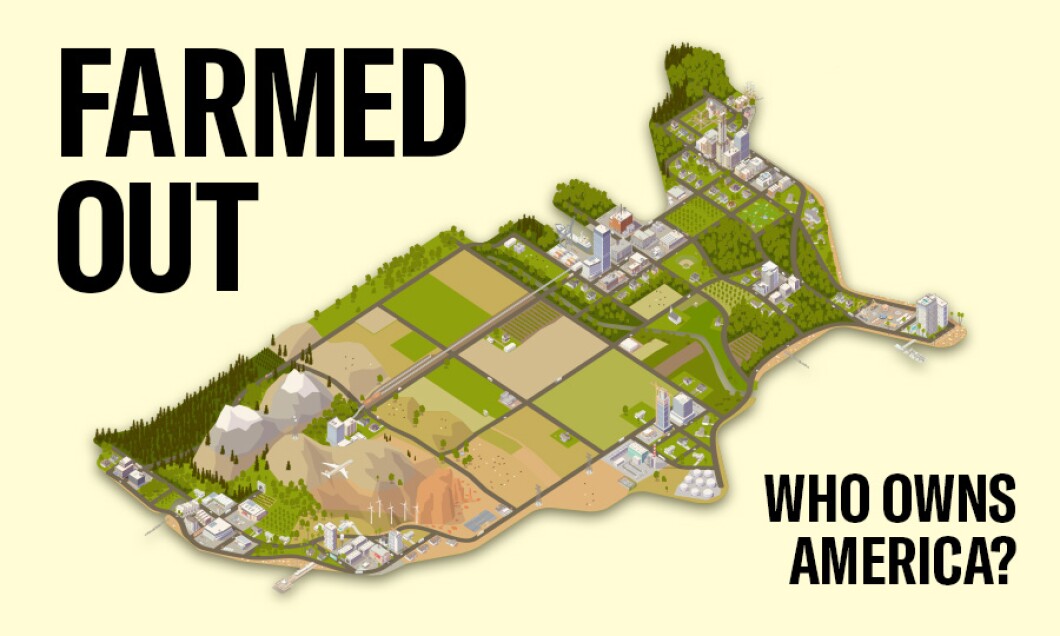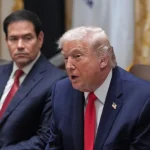
The growing Chinese ownership of U.S. land has become an unlikely battlefront in the 2024 race between former President Donald Trump, Gov. Ron DeSantis (R-FL), and the rest of the Republican field.
While China is known to own just a fraction of American agricultural land — a little less than 1% of all foreign-held land, according to the U.S. Department of Agriculture (USDA) — its investment in agricultural holdings has increased dramatically in recent years.
WHO OWNS AMERICA? WHY CHINESE LAND PURCHASES NEAR U.S. BASES HAVE SECURITY EXPERTS SPOOKED
Trump promised to address the issue in a January video. Meanwhile, DeSantis has issued executive orders and is pushing state-level legislation in Florida, and other 2024 candidates are also highlighting the issue on the campaign trail.
The February shoot-down of a Chinese spy balloon off the East Coast, combined with a local North Dakota city council finally rejecting the Chinese government-linked Fufeng Group’s plans for a site very close to Grand Forks Air Force Base in North Dakota, helped crystallize the China challenge, but also highlighted U.S. weaknesses and significant gaps in tracking and addressing it. Chinese investors owned just 69,295 acres of American land at the end of 2011, according to the USDA, but by the end of 2021, Chinese investors controlled 383,935 acres.

Donald Trump
Trump released a video in January saying that “we need to enact aggressive new restrictions on Chinese ownership of any vital infrastructure in the United States,” including farmland “and other strategic national assets.”
The former president said he would take action if elected again.
“We should stop all future Chinese purchases in these essential industries. And we should begin the process of forcing the Chinese to sell any current holdings that put our national security at risk. If we don’t do this, the United States will be owned by China, which would make them very happy,” Trump said. “When I’m president, I will ensure that America’s future remains firmly in American hands, just as I did when I was president before.”
Trump argued in January that “China is buying up our country.” He added that China was “buying up” U.S. farmland, food supplies, technologies, minerals and natural resources, ports and shipping terminals, and “the pillars” of the U.S. energy industry.
“While some are focused on China’s purchases near power plants and military bases, the fact is we should be very concerned about all Chinese Communist activity in the United States,” Trump said. “As I’ve long said, economic security is national security. China does not allow American companies to take over their critical infrastructure, and America shouldn’t allow China to take over our critical infrastructure. I didn’t allow it when I was president, and I won’t allow it when I become president again.”
USDA said that through the end of 2016, just before Trump took office, foreign investors owned 28.3 million acres of U.S. land, representing 2.2% of all privately-held U.S. land. China owned 246,543 acres at the time.
By the end of Trump’s presidency, USDA said 37.6 million acres of U.S. land now had foreign owners, an increase of nearly 10 million acres, with foreign ownership then making up 2.9% of privately-owned U.S. land. China held 352,140 acres by the end of 2020 — an increase of more than 100,000 acres over four years.
Ron DeSantis
DeSantis also said in January that “we don’t want to have holdings here by hostile nations.”
“We don’t want to have holdings by hostile nations. If you look at the Chinese Communist Party, they’ve been very active gobbling up land,” DeSantis said. “And when they have interests that are opposed to ours and we see how they have wielded their authority, especially with President Xi, who’s taken a much more Marxist-Leninist turn, that is not in the best interest of Florida to have the Chinese Communist Party owning farmland, owning land close to military bases.”
DeSantis added at the press conference that “my view is … OK, yeah, no farmland, but why would you want them buying residential developments or things like that?” He said that “we do not need to have CCP influence in Florida’s economy.”
DeSantis signed an executive order to prohibit government entities from purchasing or using technology products and services from companies owned by, controlled by, or based in seven foreign “countries of concern” — Cuba, Iran, North Korea, Syria, Russia, Venezuela, and China. His main focus was China.
DeSantis first won the governorship in November 2018, and the USDA said by the end of that year, Florida had the fourth-highest percentage of foreign-owned land of any state, behind Maine, Hawaii, and Washington. The department said 1.26 million acres of Florida land, or 5.8% of privately-owned land in the state, was foreign-owned.
USDA said that by the end of 2021, Florida was tied with Alabama as still having the fourth-highest percentage of foreign-controlled land among U.S. states. There were 1.38 million foreign-owned acres in Florida as of the end of 2021, making up 6.3% of privately-owned land in the state.
The Florida governor held a “Stop CCP influence” press conference in September.
“We do not want to see malign foreign influence in the state of Florida. And the No. 1 source of that influence, not just in the United States but really around the world, is the Chinese Communist Party,” DeSantis said. “From server farms to farmland, the Communist Party of China has been worming its way into our nation’s data storage systems and buying up tracts of land near sensitive national security sites.”
DeSantis has proposed legislation that is currently being considered during the Florida legislative session which would prohibit purchases of agricultural land and the land surrounding military bases by “foreign countries of concern,” including China.
He said, “Florida is leading the way to protect our nation from international foes” by prohibiting these foreign land purchases and cracking down on Confucius Institutes in his state.
“You also have the CCP buying land near our military installations. Why are they doing that? Well, of course, they want to get intelligence. They want to know what’s going on here in the United States,” DeSantis said. “We have 21 military bases from each of the branches of the armed forces here in the state of Florida, and we view that as something that’s significant. So we have to be on the lookout for what they’re doing.”
The Florida governor also raised “national security” concerns about openly Chinese organizations or Chinese “front group” companies buying up U.S. farmland, saying, “That is something that the U.S. as a whole needs to take much more seriously, and what we’re going to be doing in Florida is doing that.”
DeSantis traveled to Japan this week, where he touched on the Chinese land ownership issue again.
“One thing people are concerned about out here, of course, is the rise of the CCP, and they’re concerned about the security situation,” the Florida governor said in Tokyo. “One of the things they complimented us on in Florida is I’m going to be signing legislation very soon eliminating the possibility of CCP land purchases in Florida. No farmland. No land near critical infrastructure. None.”
2024 field
Some 2024 candidates have pushed the issue of Chinese land ownership in the context of Iowa.
Nikki Haley, a former United Nations ambassador under Trump as well as the former governor of South Carolina, has spoken out forcefully against Chinese ownership of American land as she hits the campaign trail.
“Iowans are tough. They don’t want Communist China buying their farmland,” Haley tweeted after an April 10 town hall event in Iowa.
“China has bullied America for decades,” she said during an interview with Brian Kilmeade on Fox News in March. “Yet, Joe Biden lets them get away with COVID, stealing our secrets, and buying American farmland.”
CLICK HERE TO READ MORE FROM THE WASHINGTON EXAMINER
Vivek Ramaswamy, a biotech executive and another Republican candidate for president, said Congress should address the issue of Chinese government-linked entities.
“In an ideal world, Congress would ban CCP affiliates from owning U.S. land. But, in a world where Congress does not act, it is legitimate for states to take action in the meantime,” Ramaswamy told the Washington Examiner.





